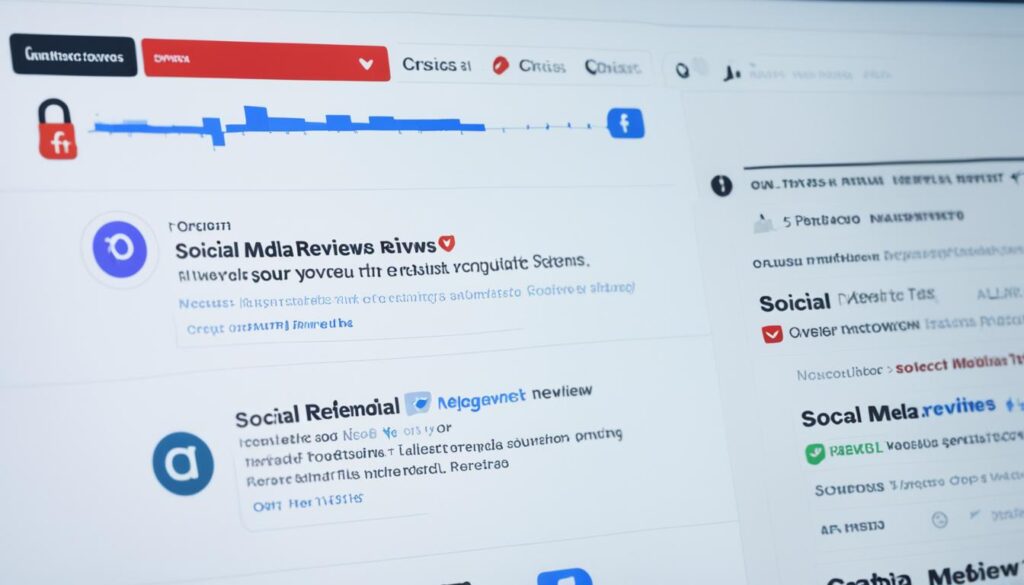Have you ever seen how a single bad review can blow up into a big crisis for your business? In today’s fast-paced digital world, knowing how to handle crises and manage risks is key for any company. We’re exploring how to deal with social media crises and protect your brand’s reputation.
Not every bad mention is a crisis. Some are just harmless, like a competitor’s problem. But others, like a single bad review among many good ones, can be serious1. When negative feelings spread fast, it’s crucial to act quickly to stop more damage1.
A crisis can really hurt your business. Did you know 22% of companies could lose customers with just one bad article online2? This shows why having a good crisis plan is vital. In fact, 80% of companies do better in crises with a current plan3.
To keep trust and credibility when things get tough, having a strong PR crisis plan is key. This plan should quickly and wisely address the situation. It helps us tell everyone what’s happening, the risks, and what we plan to do. This way, we can lessen the negative views and protect our brand’s image.
Key Takeaways
- Not all negative mentions are crises, but rapid spread of negative sentiment requires action
- A single negative article can significantly impact business
- Having an updated crisis management plan greatly improves crisis handling
- Immediate and strategic responses are crucial for maintaining trust
- Informing all stakeholders about the situation and planned actions is key
- Effective crisis management helps protect corporate reputation
Understanding the Impact of Crisis Situations on Business Reputation
Crisis situations can really hurt a company’s good name. Studies show that a company’s reputation is built on being competent and empathetic4. In hard times, a strong reputation is key for managing a crisis, helping companies get through tough spots4.
Crises hit businesses hard. From 2014 to 2019, 69% of leaders faced a crisis, with an average of three crises per leader5. These crises can cause sales to drop, customers to be unhappy, and loyalty to decrease5. Social media makes these problems worse, so responding quickly is key to keeping trust.
Good crisis management is a must. Yet, 29% of companies that had a big crisis didn’t have anyone ready to handle it5. Not being prepared can make things worse for a business’s reputation. Companies should figure out what crises could happen and plan for them.
“People remember how organizations responded to a crisis, shaping their long-term reputation.”
Leaders need to act fast in crises. Waiting too long can really hurt the company4. Seeing crises as management issues helps companies deal with them better4. The choices made during these times tell stakeholders a lot about the company’s character46.
Establishing a Crisis Management Plan
A well-defined crisis management plan is key for handling crises and recovering from disasters. We must build a crisis management team with clear roles. This team is vital for quick and well-coordinated actions during emergencies.
To make a solid plan, we start by listing possible crisis situations and their risks. This helps us plan how to react to each one7.

Our plan should have steps for escalating situations and set rules for handling them. These steps are key for keeping our business going during tough times. Training employees on how to communicate and respond in a crisis is also crucial.
Studies show how vital being prepared is. Companies without a crisis plan often suffer a 47% hit to their finances from crises, while those with a plan fare better at 31%8. Sadly, 43% of companies hit by a big disaster and lacking a plan don’t make it back, and 75% go under within three years9.
To avoid these outcomes, we should check for weak spots and use tools to assess risks. Being proactive, like stockpiling supplies or doing predictive maintenance, is part of our plan.
| Key Components | Benefits |
|---|---|
| Crisis Response Team | Coordinated action |
| Escalation Procedures | Swift response |
| Predefined Protocols | Consistent handling |
| Employee Training | Prepared workforce |
By using these strategies, we can boost our crisis management skills. This ensures our business can keep going even when things get tough.
Implementing Effective Monitoring and Early Detection Systems

In today’s digital world, it’s key to have good monitoring and early detection systems for managing risks and responding to incidents. We’ve seen more violent conflicts since 2010, showing the need for preventive steps10. Companies that have gone through tough times say they need to work on three main areas: knowing crisis scenarios, having quick communication plans, and talking well with employees11.
To tackle these issues, companies should:
- Use social media listening tools
- Set up media monitoring systems
- Look into customer feedback
These tools give real-time insights and alerts on possible crises, helping companies react fast. By grouping issues instead of planning for each one, companies can be more efficient and ready11.
Early warning systems are being used at different levels, from governments to non-profits. For example, the Economic Community of West African States (ECOWAS) has the Early Warning and Response Network (ECOWARN) to alert on new crises10. In health, global surveillance systems have been key in fighting infectious diseases like SARS and COVID-1912.
| Crisis Type | Monitoring Tool | Benefits |
|---|---|---|
| Social Media | Sentiment Analysis | Tracks brand mentions and public perception |
| Product Issues | Customer Feedback Analysis | Identifies potential product defects early |
| Public Health | Global Surveillance Systems | Detects disease outbreaks and tracks spread |
By using these monitoring systems, companies can spot problems early, lessen the damage from crises, and respond better11. As threats change, early warning systems must also evolve to meet new challenges10.
Responding to Crisis Situations: Immediate Action Steps

When a crisis hits, acting fast is key to protect our company’s image. We must publicly acknowledge the issue and show we care about those affected. Being open and giving facts is vital to avoid rumors.
Our crisis team should quickly get emergency resources ready. Making fast decisions helps us handle the crisis well and reduce risks13. Keeping lines of communication open lets us answer questions from our audience on social media and other places.
If needed, we should write a heartfelt apology. Taking blame for our actions and promising to fix the problem is important. We also need to have plans to limit the crisis’s effects, like watching online talks.
During a crisis, changing how we work can help. Many companies have started remote work during tough times, keeping things running smoothly and keeping employees together14.
“In times of crisis, clear communication and empathy are our most powerful tools for preserving trust and reputation.”
Here’s a table with key steps for a good crisis response:
| Action Step | Purpose | Impact on Reputation |
|---|---|---|
| Acknowledge the issue | Show awareness and concern | Builds trust and transparency |
| Provide factual information | Counter misinformation | Establishes credibility |
| Keep communication open | Address ongoing concerns | Demonstrates responsiveness |
| Craft apology if needed | Accept responsibility | Shows integrity and accountability |
| Monitor online discussions | Gauge public sentiment | Enables proactive management |
Remember, 95% of business leaders know they need to get better at crisis management13. By taking these steps, we can handle crises better and keep our company’s reputation safe.
Strategies for Mitigating Negative Reviews During a Crisis

When a crisis hits, acting fast is crucial to stop negative feelings from spreading. Answering complaints within an hour can stop the problem from getting worse on social media1516.
Being open during a crisis helps reduce damage to our reputation. We must quickly address important social media comments to show we value transparency and trust1517.
Talking to those affected shows we care about solving their problems. It’s important to see negative comments as chances to get better, not threats1517.
To handle negative reviews well:
- Use simple, relatable language in responses
- Express empathy and willingness to resolve issues
- Take sensitive matters offline to private channels
- Highlight positive customer stories
- Conduct interactive polls for engagement
- Host Q&A sessions to strengthen community ties
By using these strategies, we can protect our reputation and manage crises on social media. Remember, staying active builds communities and loyalty. This can help lessen negative feelings during tough times1617.
| Crisis Response Element | Impact on Reputation |
|---|---|
| Swift Response (within 1 hour) | Prevents escalation |
| Transparent Communication | Reduces reputational damage |
| Engagement with Affected Audiences | Provides valuable insights |
| Personalized Responses | Shows attention to issues |
| Empathetic Communication | Builds trust and loyalty |
Conclusion
Effective crisis management is key in today’s fast business world. It helps keep a company’s reputation and trust strong. Companies that focus on crisis management can handle tough times better and protect their people18. Having a solid crisis management plan lets businesses act fast when threats come up and keeps their reputation safe18.
Being clear in a crisis is very important. It’s crucial to share information well to keep everyone informed and calm18. This keeps trust and credibility, which are crucial for doing well over time. Having a team for crisis communication and using many ways to share information are key to managing a crisis well19.
When a crisis hits, making quick decisions with little info is common. Making strategic decisions in a crisis means deciding how to use resources wisely and thinking about the future20. To be ready for a crisis, companies should plan for different scenarios and practice being prepared. This helps them see what challenges they might face and plan how to deal with them, making them stronger to get through and bounce back from crises20.
FAQ
What is the impact of a crisis situation on a business’s reputation?
Why is a crisis management plan important?
How can businesses implement effective monitoring and early detection systems?
What are the immediate action steps when responding to a crisis situation?
How can businesses mitigate negative reviews during a crisis?
What are the key strategies for effective crisis management?
Source Links
- 7 Steps for Effective PR Crisis Management in 2024 [Infographic] | Brand24 – https://brand24.com/blog/pr-crisis-management/
- Steps to Take to Weather a Public Relations Crisis – https://www.businessnewsdaily.com/8935-recover-from-pr-crisis.html
- Crisis Management and Communications | Institute for Public Relations – https://instituteforpr.org/crisis-management-and-communications/
- Responding to Crisis: A Spotlight on Your Organization – https://www.gsb.stanford.edu/insights/responding-crisis-spotlight-your-organization
- How Crisis Management Can Change Your Business and Customer Relationships – https://blog.hubspot.com/service/crisis-management
- What is Crisis Management and how to implement in few steps? – https://www.imd.org/blog/management/what-is-crisis-management/
- Step-by-Step Guide to Writing a Crisis Management Plan – https://www.smartsheet.com/content/crisis-management-plan
- Creating a Successful Crisis Management Plan – https://www.nsf.org/knowledge-library/creating-successful-crisis-management-plan
- What is a Crisis Management Plan? (6 Steps) [2024] • Asana – https://asana.com/resources/crisis-management-plan
- Setting up early warning and response systems to prevent violent conflicts and save lives – https://blogs.worldbank.org/en/dev4peace/setting-early-warning-and-response-systems-prevent-violent-conflicts-and-save-lives
- Planning to Reduce Crisis Overload – https://www.bernsteincrisismanagement.com/planning-to-reduce-crisis-overload/
- Need for effective detection and early warnings for epidemic and pandemic preparedness planning in the context of multi-hazards: Lessons from the COVID-19 pandemic – https://www.ncbi.nlm.nih.gov/pmc/articles/PMC10148710/
- 4 Stages of Crisis & Crisis Management [+ Free Template] – https://www.alertmedia.com/blog/stages-of-crisis/
- Risk Management Magazine – Key Elements of Effective Crisis Response – https://www.rmmagazine.com/articles/article/2023/11/01/key-elements-of-effective-crisis-response
- Strategic Approaches for Responding to Negative Publicity: A Detailed Guide – https://blog.smartcomment.com/negative-publicity-guide
- Handling Negative Feedback and PR Challenges in Social Media – https://www.theadfirm.net/handling-negative-feedback-and-pr-challenges-in-social-media/
- How can you manage negative social media comments during a crisis? – https://www.linkedin.com/advice/0/how-can-you-manage-negative-social-media
- Crisis Response Planning: A Guide to Crisis Management – https://getofficely.com/blog/crisis-response-planning-a-guide-to-crisis-management
- Common challenges of crisis communications—and how to overcome them – https://firstup.io/blog/common-challenges-of-crisis-communications-how-to-overcome-them/
- Key Strategies for Effective Decision-Making in Crisis Management – https://bryghtpath.com/key-strategies-for-effective-decision-making-in-crisis-management/

